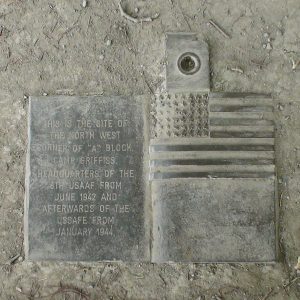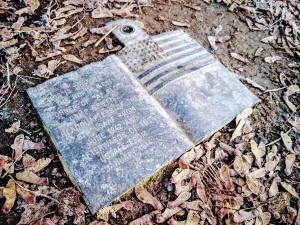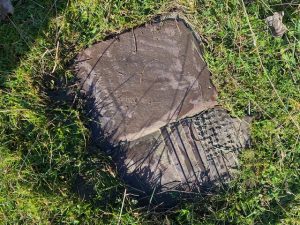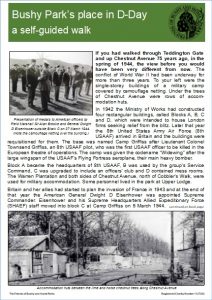PLAQUES FOR THE MEMORY






One of the many secrets of Bushy Park’s history as a military base is the fourteen plaques shaped like an open book which sit just below the surface of the Bushy Park grasslands marking the corners of the main military accommodation huts A, B, C, D when the park was turned in to the American air force Camp Griffiss in 1942 in the run up to D-Day and Operation Overlord.
The plaques were only unveiled much later on in June 6 1994 to mark the 5oth anniversary commemorations of the D-Day landings but their existence is largely a hidden secret and intriguing mystery to the thousands of visitors, walkers and cyclists who use the park regularly and who may accidentally stumble across them.
A small leaflet, which is available in the Visitors Centre near The Pheasantry Café in Bushy Park is freely available and highlights the locations of the plaques, which mark the four corners of each of the four blocks and offers a helpful route, much like a historic ‘treasure trail’ with details of the species of nearby trees.
But it does take some detective work…
One plaque (Number 16) went missing, believed stolen, and later popped up on eBay where it was spotted by a Friend of the Park and immediately purchased and saved for history and is now kept at The Stockyard in the park. The other spot is marked by the commemorative plaque marking the spot (Number 11) where General Dwight ‘Ike’ Eisenhower had his personal HQ and office.
Each of the plaques has an inscription on the left hand side describing the position such as North West of A block Camp Griffiss, headquarters of the 8th USAAF from June 1942 and afterwards of the USSAFE from January 1944.
Block A was the first to be completed and became the headquarters of the US 8th Air Force under General Spatz when he arrived in June 1942.
Block B was completed soon after block A and initially became the headquarters of the 8th Air Force Service Command, dealing with maintenance, supply and ancillary services. Service Command personnel were housed in the former Kings Canadian School at Upper Lodge in the north-west corner of the park where upgraded facilities housed 1,000 men.
Block C housed three functions: the western end housed the officers’ mess fitted out by Bentalls of Kingston. The office of Air Marshall Tedder, the Deputy Supreme Commander Allied Expeditionary Force was in the north-east corner, SHAEF having moved into Camp Griffiss in January 1944.
The office of the Supreme Commander, General Eisenhower, was in the south-east corner of the block and here D-Day was planned. Block D was the last of the four blocks to be completed, being ready for occupation on 13 March 1943.
https://www.londonremembers.com/memorials/camp-griffiss-block-a-nw-corner


